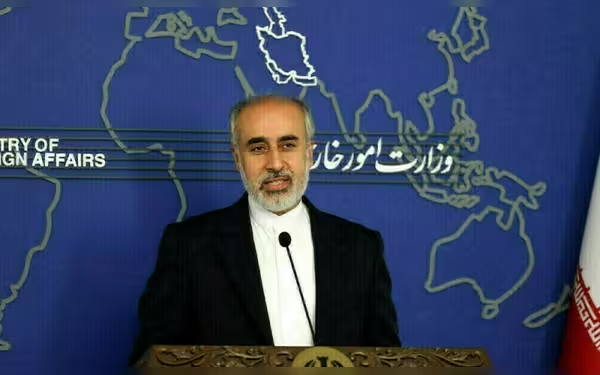Saturday, November 16, 2024 08:54 PM
Iran Vows Hezbollah's Resistance Will Continue After Nasrallah's Killing
- Iran asserts Hezbollah's path will persist despite Nasrallah's death.
- Hezbollah confirms Nasrallah killed in Israeli air strike in Beirut.
- Iran condemns Israeli actions as a massacre in Lebanon.
 Image Credits: brecorder
Image Credits: brecorderIran declares Hezbollah's resistance will continue following the killing of leader Hassan Nasrallah in an Israeli air strike in Beirut.
In a significant escalation of tensions in the Middle East, Iran's foreign ministry has declared that the path of Hezbollah's chief, Hassan Nasrallah, will persist despite his recent killing in an Israeli air strike in Beirut. This incident marks a critical moment in the ongoing conflict between Israel and Hezbollah, which has seen a year of cross-border clashes. The foreign ministry spokesman, Nasser Kanani, expressed his sentiments on social media, stating, "The glorious path of the leader of the resistance, Hassan Nasrallah, will continue and his sacred goal will be realised in the liberation of Quds (Jerusalem), God willing."
Hezbollah, the Lebanese militant group that is heavily armed and financed by Iran, confirmed Nasrallah's death on Saturday. This confirmation came after Israel announced that it had "eliminated" him in an air strike a day earlier. The group stated that Nasrallah was killed alongside other members during what they described as a "treacherous Zionist strike on the southern suburbs" of Beirut.
In the wake of this tragedy, Iranian Vice President Mohammad Javad Zarif extended his condolences, praising Nasrallah as a "symbol of the fight against oppression." The mourning for Nasrallah was palpable, with a black flag raised at the holy Imam Reza shrine in Mashhad, Iran. Mourners gathered there, waving yellow Hezbollah banners and Iranian flags, chanting, "Death to Israel," as reported by state television.
Lebanon's health ministry has reported a preliminary toll of six dead and 91 wounded from the recent strikes on Beirut's densely populated southern suburbs. This wave of violence is noted as the fiercest to hit Hezbollah's stronghold since the last war between Israel and the group in 2006.
Earlier on Saturday, Iran's supreme leader, Ayatollah Ali Khamenei, condemned the Israeli actions, labeling them a "massacre" in Lebanon and criticized what he termed the "shortsighted" Israeli policy. This rhetoric underscores the deep-seated animosity and the complex geopolitical dynamics at play in the region.
The killing of Hassan Nasrallah, a prominent figure in the resistance against Israel, raises questions about the future of Hezbollah and its operations. As Iran continues to support the group, the potential for further conflict remains high. The situation is a stark reminder of the fragile peace in the region and the ongoing struggle for power and influence among various factions. As events unfold, the international community watches closely, hoping for a resolution that can bring lasting peace to a region long plagued by violence.













